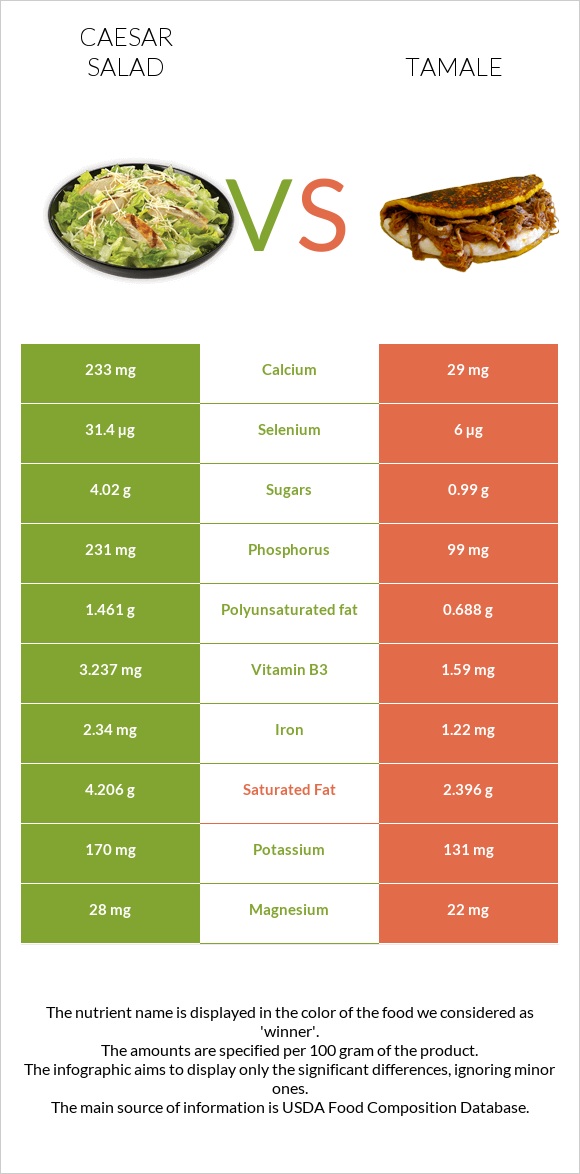Caesar salad vs. Tamale — In-Depth Nutrition Comparison
Compare
The main differences between caesar salad and tamale
- Caesar salad is richer than tamale in selenium, vitamin B1, calcium, phosphorus, vitamin B2, iron, vitamin B3, vitamin A, and copper.
- Daily need coverage for selenium for caesar salad is 46% higher.
- Tamale contains less saturated fat.
- Caesar salad has a lower glycemic index than tamale.
Food types used in this article are LITTLE CAESARS 14" Original Round Cheese Pizza, Regular Crust and Tamales (Navajo).
Infographic

Infographic link
Mineral Comparison
Mineral comparison score is based on the number of minerals by which one or the other food is richer. The "coverage" charts below show how much of the daily needs can be covered by 300 grams of the food.
| Contains more MagnesiumMagnesium | +27.3% |
| Contains more CalciumCalcium | +703.4% |
| Contains more PotassiumPotassium | +29.8% |
| Contains more IronIron | +91.8% |
| Contains more CopperCopper | +100% |
| Contains more PhosphorusPhosphorus | +133.3% |
| Contains more ManganeseManganese | +84.5% |
| Contains more SeleniumSelenium | +423.3% |
Vitamin Comparison
Vitamin comparison score is based on the number of vitamins by which one or the other food is richer. The "coverage" charts below show how much of the daily needs can be covered by 300 grams of the food.
| Contains more Vitamin AVitamin A | +∞% |
| Contains more Vitamin EVitamin E | +∞% |
| Contains more Vitamin B1Vitamin B1 | +654% |
| Contains more Vitamin B2Vitamin B2 | +271.3% |
| Contains more Vitamin B3Vitamin B3 | +103.6% |
| Contains more Vitamin B5Vitamin B5 | +118% |
| Contains more Vitamin KVitamin K | +∞% |
| Contains more Vitamin CVitamin C | +∞% |
| Contains more Vitamin B12Vitamin B12 | +35% |
All nutrients comparison - raw data values
| Nutrient |  |
 |
DV% diff. |
| Selenium | 31.4µg | 6µg | 46% |
| Vitamin B1 | 0.377mg | 0.05mg | 27% |
| Calcium | 233mg | 29mg | 20% |
| Phosphorus | 231mg | 99mg | 19% |
| Vitamin B2 | 0.297mg | 0.08mg | 17% |
| Protein | 13.39g | 6.28g | 14% |
| Iron | 2.34mg | 1.22mg | 14% |
| Vitamin B6 | 0.143mg | 11% | |
| Vitamin B3 | 3.237mg | 1.59mg | 10% |
| Vitamin A | 78µg | 0µg | 9% |
| Saturated fat | 4.206g | 2.396g | 8% |
| Copper | 0.126mg | 0.063mg | 7% |
| Calories | 265kcal | 153kcal | 6% |
| Fiber | 1.7g | 3.1g | 6% |
| Manganese | 0.321mg | 0.174mg | 6% |
| Vitamin B12 | 0.4µg | 0.54µg | 6% |
| Fats | 9.54g | 6.12g | 5% |
| Starch | 25.29g | 12.27g | 5% |
| Vitamin B5 | 0.447mg | 0.205mg | 5% |
| Vitamin K | 5.9µg | 5% | |
| Polyunsaturated fat | 1.461g | 0.688g | 5% |
| Carbs | 31.5g | 18.12g | 4% |
| Vitamin E | 0.61mg | 0mg | 4% |
| Folate | 15µg | 4% | |
| Vitamin C | 0mg | 1.7mg | 2% |
| Cholesterol | 24mg | 17mg | 2% |
| Magnesium | 28mg | 22mg | 1% |
| Potassium | 170mg | 131mg | 1% |
| Zinc | 1.61mg | 1.48mg | 1% |
| Sodium | 454mg | 427mg | 1% |
| Monounsaturated fat | 2.38g | 2.739g | 1% |
| Fructose | 1.13g | 0.17g | 1% |
| Protein per 100 calories | 5.052830188679246g | 4.104575163398692g | N/A |
| Calories per 10 g protein | 197.90888722927556kcal | 243.63057324840764kcal | N/A |
| Net carbs | 29.8g | 15.02g | N/A |
| Sugar | 4.02g | 0.99g | N/A |
| Tryptophan | 0.15mg | 0.052mg | 0% |
| Threonine | 0.393mg | 0.239mg | 0% |
| Isoleucine | 0.547mg | 0.271mg | 0% |
| Leucine | 1.137mg | 0.568mg | 0% |
| Lysine | 0.523mg | 0.427mg | 0% |
| Methionine | 0.3mg | 0.15mg | 0% |
| Phenylalanine | 0.717mg | 0.275mg | 0% |
| Valine | 0.7mg | 0.318mg | 0% |
| Histidine | 0.36mg | 0.196mg | 0% |
| Omega-3 - ALA | 0.155g | 0.029g | N/A |
Macronutrient Comparison
Macronutrient breakdown side-by-side comparison
Protein:
13.39 g
Fats:
9.54 g
Carbs:
31.5 g
Water:
43.39 g
Other:
2.18 g
Protein:
6.28 g
Fats:
6.12 g
Carbs:
18.12 g
Water:
68.1 g
Other:
1.38 g
| Contains more ProteinProtein | +113.2% |
| Contains more FatsFats | +55.9% |
| Contains more CarbsCarbs | +73.8% |
| Contains more OtherOther | +58% |
| Contains more WaterWater | +56.9% |
Fat Type Comparison
Fat type breakdown side-by-side comparison
Saturated fat:
Sat. Fat
4.206 g
Monounsaturated fat:
Mono. Fat
2.38 g
Polyunsaturated fat:
Poly. Fat
1.461 g
Saturated fat:
Sat. Fat
2.396 g
Monounsaturated fat:
Mono. Fat
2.739 g
Polyunsaturated fat:
Poly. Fat
0.688 g
| Contains more Poly. FatPolyunsaturated fat | +112.4% |
| Contains less Sat. FatSaturated fat | -43% |
| Contains more Mono. FatMonounsaturated fat | +15.1% |
Carbohydrate type comparison
Carbohydrate type breakdown side-by-side comparison
Starch:
25.29 g
Sucrose:
0 g
Glucose:
0.98 g
Fructose:
1.13 g
Lactose:
0.07 g
Maltose:
1.67 g
Galactose:
0.16 g
Starch:
12.27 g
Sucrose:
0.4 g
Glucose:
0.21 g
Fructose:
0.17 g
Lactose:
0 g
Maltose:
0.22 g
Galactose:
0 g
| Contains more StarchStarch | +106.1% |
| Contains more GlucoseGlucose | +366.7% |
| Contains more FructoseFructose | +564.7% |
| Contains more LactoseLactose | +∞% |
| Contains more MaltoseMaltose | +659.1% |
| Contains more GalactoseGalactose | +∞% |
| Contains more SucroseSucrose | +∞% |





